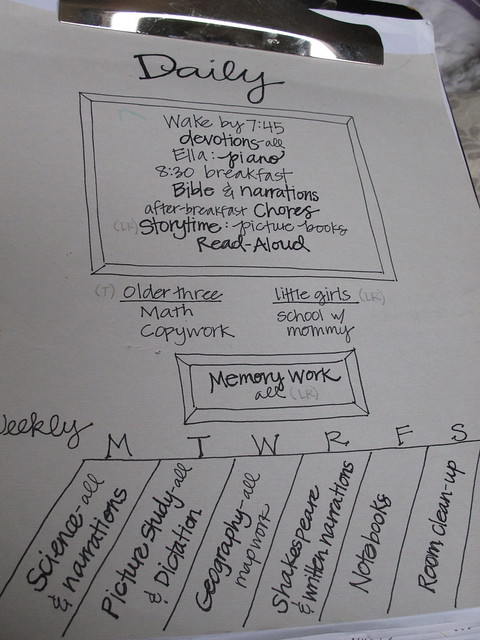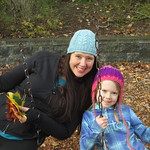This is Part 2 in an impromptu series I'm doing in response to a readers question about our schedule.
Here is her question:
I know this was a while back, but I really love the simplicity of that schedule you shared (the picture in the other post of your school schedule). I'm curious what resources you're using for things like math and dictation (are you using Spelling Wisdom or just choosing something each week, etc.). Anything in particular for Bible, memory, poetry, etc or just choosing as you go? What about geography and science? And, written narrations ... are you just letting Ella choose what she will write from? Thanks so much! You really know how to simplify and make it feel calm (or at least appear that way). :)I already discussed the resources we use for math in Part 1.
For dictation, (Have I not shared how we do dictation here on the blog? I feel like I've written a whole post on this very thing but I can't seem to find it anywhere!)
I am entirely indebted to Linda Fay for the way we do dictation. She has several posts on dictation, and they can be found here.
This method of dictation is the way we teach spelling and grammar in our home. It's also great handwriting practice! We do this once a week. And both of my children are excellent spellers.
Here is what I do with my two oldest (12 & 10):
1. Choose a book
I grab a book-- something we are currently reading, whether it be a read-aloud, a history book, or one of the books they are reading from their assigned reading list-- and choose a short paragraph or a few sentences and point it out to them. I intentionally choose a passage that has words they may not know how to spell, or something with dialogue or interesting punctuation.
2. Child studies the passage you've selected (x2)
Their first read-through is for spelling. They study the passage, looking for words that are unfamiliar to them. Then they tell me the words they're unsure of, and I write them on the board. They study those words, one by one, until they can close their eyes and "write" (spell) the word in the air. When they're confident with that word, I erase the word from the board and they move on to the next one. When there are no more words on the board, we move on. This can take several minutes (which means you can be helping younger kids with something, loading the dishwasher, or doing meal-prep).
They read through the passage for a second time, looking closely at the punctuation. This usually doesn't take long. When they are ready to begin, we move on.
3. Dictate the passage slowly
I take the book and slowly dictate the (now familiar) passage to them- three to five words at a time, pausing while they write. This step requires patience from me. :) I try to have something nearby at the table that I can be working on while they write.
4. Child corrects him/herself
Then they correct their own work, by taking the book and checking their work to the passage. This is their favorite part! They each have red pens and white out and they go to town, or take great pride in having a perfect dictation.
Other notes/tips:
- Sometimes I choose the same passage for both of my kids (to save time), and sometimes we do it separately. It just depends on how much time we have.
- I have found that writing is much more painstaking for my son than for my daughter. So the key here is quality, not quantity. Start small. Choose one sentence with one or two challenging words, and build from there.
- They also love to correct each others' work!
- My 9-yr-old son is still very much working on proper letter formation and spacing, and writing does not come easily for him. At all. For these reasons, he does not do dictation yet. He and I are going through All About Spelling, for a season, until he is up to speed and can start short dictation lessons. I think All About Spelling is an excellent program and works great for him because of its multi-sensory approach.
Coming up in Part 3: Bible, Memory work and Poetry.



This is so helpful. Thank you!
ReplyDeleteI'm still praying for your heart and body as you heal. Blessings.
Thank you, Annie! Blessings to you and yours,
Delete~Stacy
[Response to Kamille. I found your comment on my recent Shakespeare post, but I was wondering if you meant to put it here. I wanted you to be able to find it, so I'm posting my response to you in both places!]
ReplyDelete~
Let's see... re: planning, I have done it both ways-- planned everything in advance, and nothing in advance. ;)
The everything-in-advance plan didn't work for me/us, because life happens, and we'd get sick or something and then we'd fall behind and I would go crazy staring at my lesson plans which were now several days or weeks behind. It also left me no room for spontaneity, which I discovered is important to me.
The nothing-in-advance plan doesn't go well, either, because then I spend most of my day running around making copies, pulling things together that we need, figuratively scratching my head and trying to get it all going on the fly.
And so somewhere in there is a happy medium. I try to outline our year in advance and put in the things that I can easily plan (that I could also easily shift to another day). My older kids do have lesson plans for math and history that they check off, but we can be fluid with that, too, if need be. And then each week I print up weekly checklists for the kids (but I'm working off a master copy for each of them.)
I do create my own spreadsheets/checklists.
I hope this isn't too confusing. You're welcome to come on over and see any of it, anytime! ;)
~Stacy
Hi Stacy--I did mean to write my comment on the other page; but, yes I was referring to this post as well. Thanks for putting the comments on both:)
Delete